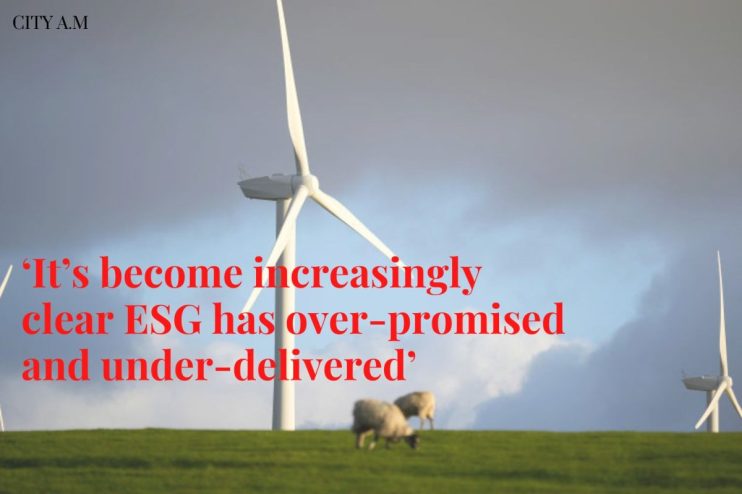Let’s be honest, Larry Fink is right and we should give up on broken ESG investing

ESG and green investing has found itself unable to deliver and at the heart of a culture war, writes Matthew Lesh
Environmental, social and governance (ESG) is not only meant to solve humanity’s immense challenges, from climate change to racial inequality, but also deliver better returns for investors.
It is becoming increasingly clear, however, that ESG has over-promised and under-delivered. Vocal advocates are even stepping back from their once-fervent views. BlackRock’s Larry Fink — the world’s largest asset manager and a key ESG advocate — is now “ashamed” to have been drawn into the debate and doesn’t want to use the term anymore. Fink is increasingly emphasising the fiduciary duty to deliver strong financial returns.
ESG is suffering from some serious practical and ideological challenges. What counts and who decides? Is nuclear low emissions and “green” or should we be worried about waste? Is the defence industry needed to safeguard Ukraine’s freedom, or is all war unjust?
Analysts use various methodologies to answer these questions, leading to severe inconsistency and questionable outcomes. For example, Tesla, the world’s biggest EV car producer, has rated poorly on some ESG ratings. The gaming of the system makes it difficult for investors to decide the relative merits and risks. S&P Global has responded to unreliability by withdrawing its alphanumeric ESG ratings. The UK’s Financial Conduct Authority has also recently issued an anti-greenwashing rule over concerns about misleading claims.
These measurement issues raise serious concerns that ESG investing is directing funds to worse companies for a lower return, with consultants being the only real beneficiaries. A study by Aneesh Raghunandan (LSE) and Shiva Rajgopal (Columbia University) found that ESG funds had “significantly more violations” of labour and environmental laws than non-ESG funds between 2010 and 2018. They also found that “ESG funds appear to underperform financially relative to other funds within the same asset manager and year, and to charge higher fees.”
ESG is also now at the heart of a culture war. Proponents assume it is both possible and desirable to use corporations to solve environmental and social issues. There is a significant risk, however, that businesses will fail in the face of these immense challenges that require society-wide action. In the process they will just attract the ire of the political left over hypocrisy.
At the same time, the concern that businesses are becoming “woke” is attracting anger from the political right. They view institutional investors using other people’s money to pursue social and environmental goals to be undemocratic. Over a dozen US states, led by Republicans, have enacted laws against public pension funds being diverted for ESG purposes.
This quagmire could be resolved by businesses returning to their purpose — producing high quality products, creating well-paying jobs and, ultimately, delivering profits to their shareholders. Businesses could celebrate their role in feeding humanity, keeping us connected and entertained, and developing innovations that help solve humanity’s challenges. The role of institutional investors is to identify who is doing this the most effectively, directing capital to the businesses that are best serving humanity’s needs.
ESG is stuck between a rock and a hard place. The benefits are unclear, the returns are poor and the criticism is coming from across the political spectrum. The obvious solution is investors and companies remembering their real purpose.